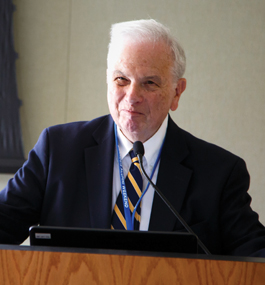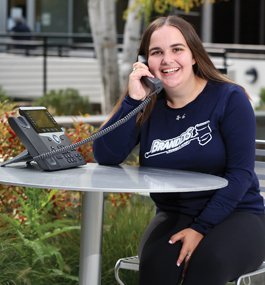Impact

Sandy Lakoff ’53
Unrestricted Support in the Age of COVID
Because of the pandemic, Sandy Lakoff ’53 decided to establish a gift at Brandeis earlier than he originally intended, to help it address the coronavirus-related instability and change every university is facing.
Lakoff, the Edward A. Dickson Professor Emeritus of Political Science at UC San Diego, established an estimated $2 million charitable gift annuity at Brandeis in May. The gift is unrestricted, meaning the university can use it for its most-pressing needs (Lakoff has given President Ron Liebowitz a “wish list,” which the president can follow at his discretion).
“As an academic myself, I don’t like the idea of tying the university’s hands,” Lakoff says.
A member of Brandeis’ second graduating class, Lakoff credits Brandeis with his career success, reporting he had “a very fulfilling, exciting college experience.” He majored in politics and served as an editor of The Justice. He recalls the distinguished visitors who came to campus: “Justices Douglas and Frankfurter lectured on the Constitution. David Ben-Gurion spoke on the founding of Israel. A poetry series meant weekends with W.H. Auden and Dylan Thomas. Leonard Bernstein mesmerized us with Mahler and led the thrilling American premiere of ‘The Threepenny Opera’ and his own ‘Trouble in Tahiti.’”
Originally, Lakoff didn’t intend to become an academic. “I was thinking about a career in journalism,” he says. “But the Brandeis faculty was so good they really opened my eyes, especially to the social sciences.”
He went on to earn a PhD in political science at Harvard and founded UCSD’s political science department in 1975. Though he’s retired, he’s still teaching UCSD adult-education lectures over Zoom. He has written or edited more than a dozen books, including “Democracy: History, Theory, Practice” (1997) and “Max Lerner: Pilgrim in the Promised Land” (1998), about the renowned journalist who became a Brandeis faculty member.
Today, Lakoff is a member of the Brandeis Board of Fellows. He has hosted Faculty in the Field events, and has returned to campus to speak at Alumni College and a Media Reunion for former Justice writers and editors.
A former university president who’s a friend of Lakoff once said to him, “Of all the universities in the country, none has achieved as much as Brandeis.”
Lakoff agrees. “Brandeis has managed to maintain a small-college feel and become a major research university, and that’s quite a remarkable feat,” he says. “The university has made tremendous strides over the years, and I simply want to see it flourish.”
— Abigail Klingbeil
When you create a charitable gift annuity, you make a gift to Brandeis and, in exchange, receive a fixed annual dollar amount for life. The principal remaining at death will then benefit Brandeis. To learn more about planned giving, email plannedgiving@brandeis.edu or visit giving.brandeis.edu/planned.

Zamira Korff
Overcoming Barriers, Redux
Brandeis’ origin — which came after its founders felt compelled to dismantle a quota system that permeated higher education — was at its core a bold exercise in overcoming barriers. Founding President Abram Sachar, joined by those first intrepid classes, constructed a university from the ground up, with all the promise and vicissitudes such a formidable undertaking encompasses.
Fast-forward 70 years, and Brandeis students again face obstacles to their education. When the pandemic first hit, Brandeisians from across the globe stepped forth to assist students with their emergency requests. The impact of your collective support is impressive and helped students prevail against trying circumstances. Thank you for your swift response and the outpouring of generosity.
While your contributions to emergency funds made a tremendous difference in the near term, a daunting barrier remains for many students and their families: how to afford a Brandeis education. A sustained pipeline of support for scholarships will give students the assurance they can remain at the university and proudly graduate with a Brandeis degree.
The reality is that before the pandemic, the university distributed about $77M annually in undergraduate financial aid. Now, students and families’ collective requests are adding another $7M to $12M to this annual expenditure. In order to meet the full demonstrated financial need of students we admit and wish to retain, we must be prepared to allot $85M or more in annual aid for the foreseeable future.
A major pillar of the Framework for the Future — the university’s vision for building a stronger Brandeis — is increasing the financial resources available to students, so they may experience all the university has to offer. The current climate has hastened our timeline in this regard, and a concentrated push for scholarship support is now of the utmost urgency. As you consider your involvement with Brandeis this year — and if you and your family are in a position to contribute — I would be deeply grateful for your gift to scholarships for Brandeis students.
Let’s not place any more hurdles in students’ paths. Instead, let’s do all we can to help them circumvent roadblocks, and see to it that they join the ranks of an alumni base 60,000 strong.
Sincerely,
Zamira Korff
Senior Vice President of Institutional Advancement
To support student scholarships at Brandeis, visit brandeis.edu/light-the-way.

Diana Epstein ’22
‘What a Delight’: Student Calls Surprise, Hearten Older Alums
When Max Perlitsh ’52 answered a phone call from Diana Epstein ’22 this summer, he was thrilled. She was ringing just to ask how he was doing.
“That she asked the right question — ‘How are you?’ — meant so much,” the Winchester, Massachusetts, resident, a member of Brandeis’ first graduating class, says today.
Epstein was calling as part of Generation to Generation, a four-week outreach effort in July and August in which students phoned older alumni to check on their well-being during the extended isolation of the pandemic. More than 2,000 alumni were called. Some 180 conversations resulted, lasting 30 minutes on average, some for as long as an hour. Many alums talked about their own experiences as students during the university’s earliest days, bolstering connections between Brandeisians across the decades.
Epstein, a Philadelphia native who’s a business major and captain of the women’s rugby team, says, “I talked with many firsts: the first person to receive a diploma from Brandeis, the first person to score a basket, the first person to major in music. And there were amazing stories about how, on a Friday afternoon, you could walk into the Castle and find Eleanor Roosevelt talking with a group of students.
“Nancy (Wolkenberg) Greenblatt ’55 told me about how her roommate, Norma Rose ’55, was one of the few people on campus who had a car,” Epstein continues, “so Norma got the coveted job of driving Leonard Bernstein back to the airport. One time, there was so much traffic, Bernstein asked Norma to switch places with him. He took over the wheel and drove the back roads to the airport so he wouldn’t miss his flight.”
Epstein’s phone call came as a “total surprise,” says Greenblatt, who lives on Manhattan’s Upper East Side. “I pick up the phone and hear this cheerful young voice identifying herself. I said to her, ‘What a delight, whoever you are.’ It was an interesting, easy conversation.”
Generation to Generation was made possible by a grant from the Louis D. Brandeis Legacy Fund for Social Justice, which also underwrites the Louis D. Brandeis Social Justice World of Work (WOW) fellowships. The WOW program supported 20 students’ virtual internships with social justice organizations this summer.
Jules Bernstein ’57, the Legacy Fund’s founder and primary benefactor, had the idea for the phone outreach.
“I read something about a volunteer program that checked in with isolated seniors during the pandemic,” Bernstein says. “It occurred to me the Legacy Fund might establish a similar program that would bring Brandeis students together with older alums. I thought they would all benefit from this kind of connection, at a time when social distancing and the resulting isolation is the necessary but difficult order of the day.”
For Epstein, the conversations provided a welcome escape. “In a time of social distancing, it was incredible to talk to new people for hours each day and hear about life at a different time, before Brandeis had a library, and when papers were written on typewriters,” she says.
“I talked to alumni who spent their childhood in Europe during the Second World War and heard their stories about bombings. I talked to alumni who had family members drafted into the Vietnam War. I talked to alumni who spent a lot of time on picket lines and protesting in the South for the civil rights movement.
“I was expecting to hear stories about Brandeis. What I got was that and so much more, including life advice, career advice and, most important, new friends.”
Brandeis Student Emergency Fund
Thanks to the generosity of alumni and friends, as of Aug. 17 the Brandeis Student Emergency Fund had provided emergency funding to close to 1,200 students since the COVID-19 pandemic began:
$99,000+ in travel reimbursements, to help 200+ students leave campus safely during the spring.
$68,000+ in food and groceries, to help nourish 175+ students.
$100,000+ toward the purchase of laptops and other technology, to help 150+ students learn remotely.
$390,000+ in rental assistance, to help close to 380 students find new housing arrangements.
We are so grateful for your support of Brandeis students throughout these uncertain times.
* * * * * *
Brandeis Giving Tuesday
One day. One goal. One ’Deis.
#GivingDEISday
